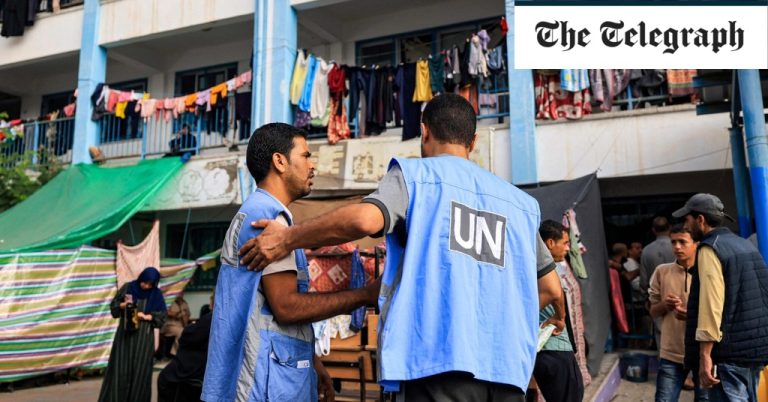Ten days ago, UNRWA’s leadership in Jordan announced that Israel had provided it with evidence that agency staff had been involved in the October 7 massacre.
According to a briefing given to the Telegraph by a senior Israeli official on Thursday, Israeli intelligence has established that at least 12 UNRWA employees are “associated with the infiltration attack”.
Of those, 10 were Hamas operatives and two belonged to Palestinian Islamic Jihad, said the official. A total of six UNRWA employees “infiltrated into Israel as part of the attack”, and four were “involved in kidnapping Israelis”, two of which also infiltrated Israeli territory.
“Three additional UNRWA employees were invited via SMS texts to arrive at an assembly area the night before the attacks on the sixth of October and they were directed to equip with weapons, but it was not confirmed that they arrived at that point,” added the official.
“At least one UNWRA employee was asked to supply logistic support to the infiltration attack and an additional employee was directed to establish an operations room on the eighth of October”.
UNRWA has sacked all the workers named by Israel but many of the organisation’s biggest funders, led by the US, have since paused their financial support, threatening its ability to continue operating in the region.
“The UK is appalled by allegations that UNRWA staff were involved in the 7 October attack, a heinous act of terrorism that the UK government has repeatedly condemned,” a spokesperson said.
A quasi-state body
Israel’s relationship with UNRWA has always been complex.
It was established in the wake of the first Arab-Israeli war of 1948 to look after Palestinians (and initially, some Jews) uprooted in the conflict.
On the one hand, it helps Israel by looking after a displaced population it would otherwise be responsible for. But it has also, in the eyes of many Israelis, prolonged the conflict because the support it provides sustains the Palestinian population in the region.
It also delivers. Literacy rates in Gaza are high at over 97 per cent, for example.
Unlike other UN bodies which provide only emergency assistance, UNRWA operates as a quasi-state body delivering everything from education, healthcare, social services, infrastructure and microfinance.
When the agency began operations in 1950, it was responding to the needs of about 750,000 Palestine refugees. Today, some 5.9 million are eligible for UNRWA services.
The population has grown because, under international law, the children of refugees and their descendants are considered refugees until a new home is found.
A parallel applies to Jews displaced by the Holocaust, with Germany, Austria and other European countries now offering citizenship to the descendants of those who were murdered or displaced.
Israel is now pushing for UNRWA to be disbanded altogether and replaced with another UN agency or NGO.
Prime Minister Benjamin Netanyahu last week accused it of providing “false” information to the World Court which is considering genocide charges against Israel.
“Many of the charges, false and unfounded, that were levelled against us in The Hague were brought by UNRWA officials,” Netanyahu told visiting ambassadors on Wednesday night.
